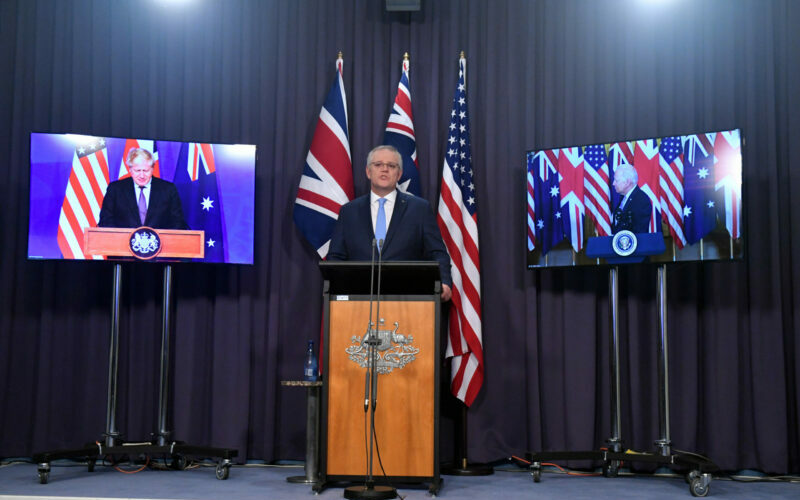New language, new national future: Australia is now an AUKUState
Oct 4, 2021
Move over “digger”, “dinkum” and “ocker”, a new Australian term is to be added to the English language at the highest levels of national discourse: the new verb, AUKUStrate and proper noun, AUKUState.
Both are derived from the recent announcement of the pact between the United Kingdom, the US and Australia, called AUKUS.
Its emergence became imperative in the light of the sensitivities surrounding language use over the last few decades. Specifically, some traditional terms, though entirely accurate, are thought to be impolitic in particular contexts. A new compendium of neologisms was required, even imperative. Accordingly, a heretofore undisclosed campaign is underway to facilitate the use of AUKUStrate and AUKUState as acceptable terms in common usage.
Because AUKUS is to be a determinant of Australia’s thought and behaviour; indeed, is almost certainly an overdetermining factor in both, there exists a need to recognise it fulsomely. Justification, as hinted above, is a delicate project, but necessary all the same.
All references to “colony” and its extensions are unacceptable, most especially to political actors possessing all the trappings of independence and sovereignty: a flag, national anthem, parliament (including duly elected members thereof), and armed forces supported to the extent of 2 per cent (or thereabouts) of GDP. Besides, “colony” was so British, pre-20th century, pre-Federation, and pre-Statute of Westminster.
“Vassal” and “vassal state” are descriptors that automatically came to mind. They captured the spirit of fidelity and homage to a superior power in return for national security being vouchsafed. But the etymology of the words themselves carried disqualifications. They had origins in Latin, a so-called dead language (no longer spoken by policy executives) where it meant manservant or domestic retainer; worse, there were also legacies from old French.
The superior power(s), however, were not opposed to the use of vassal because they has their model of it, the obligation incumbent upon vassals in the Holy Land to provide military service for as long as international security was threatened — that is, in perpetuity.
In any case, it was a term older than “colony” and thus not attuned to the rigours of description mandated in the unfolding period of the New Deference. The new term must accommodate whatever AUKUS’s protagonists claim it is, and these proclamations will, it must be understood, seldom if ever agree with each other over time, and maybe not even be true depictions of fact at the beginning.
To serve this regime of obligation what was needed was something that obscured the true meaning of a relationship involving voluntary servitude while allowing it to be used so as to imply the practice of high political virtue.
“Consigliere” came to mind. It was foreign-sounding (because it was) and those in favour of it saw the opportunity of endless evasions of demands for answers because of its undoubted multiplicity of meanings. As well, it carried gravitas, a consigliere being a trusted adviser and dispute revolver, a status that appealed to the egos of those who would be in those roles.
The problem here was that these roles were notable in organisations not favoured, in public anyway, by AUKUS political leaders, namely within the leadership structure of the Calabrian, Sicilian, and American Mafia. Besides, it had Latin origins.
‘Concierge”, though accurate and precise, was dismissed without discussion on the basis of its francophonic pedigree.
Given that the essence of AUKUS is the subordination of Australia to the demands of the Untied Kingdom and the Untied States of America, a semi-precedent was recalled of a model which accounted for the sharing of dual sovereignty over a faraway possession. Moreover, it once existed very close to Australia’s shores and was known as the Condominium of the New Hebrides.
In their metropolitan wisdom two countries claiming sovereignty over the New Hebrides followed the logic which became de rigeuer for the two-airline policy which existed, domestically and for many years, between Trans Australia Airlines and Ansett. In the name of consumer choice-as-dualism everything was duplicated.
It was, unsurprisingly, a 74-year disaster overseen by the British and the French: Condominium-as-pandemonium. Those most affected — the Ni-Vanuatu — were officially stateless, a condition thought delicate to remember. Also unsurprisingly, the term was rejected as but another example of why things French must be rejected.
By a process of exhausting the political lexicon of suitable terms something from other disciplines came to mind. The logic was impeccable: Australia is part of an ensemble that in which it is an enthusiastic but untutored and unskilled member in a complex and lengthy enterprise which, necessarily, must be conducted and coordinated by others of superior knowledge, understanding, and resources.
Australia in this context is a member of an orchestra! And the term is advantaged by not being identifiably French. The music it performs will, perforce be arranged by others but it will dutifully follow all directions of the conductor(s). It’s instrumentation is yet to be assigned but, as with players in all orchestras, this will be highly variable but always in accordance with the different needs of the composers and their understandings of the score.
Thus AUKUS is decoded, an acronym which, while being heralded as a revolutionary development in Australia’s national security (which it is), is also a bare-faced, barely concealed admission that, politically, Australia is now an AUKUState, and to be AUKUStrated.




